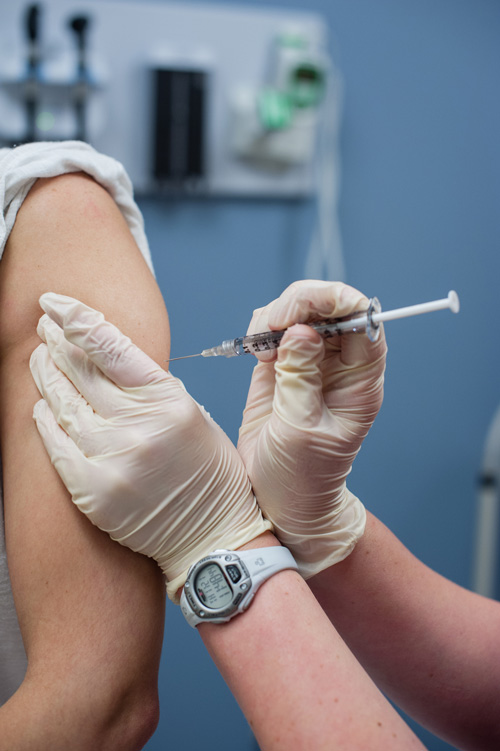Vaccines: Not just for kids
With back-to-school now in the rear-view mirror, we all know the vital importance of children being up-to-date on their vaccinations. But what about adults? Children aren’t the only ones who need vaccines. Adult vaccinations are valuable and increase in importance the older a person gets, and it’s imperative that adults reexamine their vaccination plans as they age.

As children, most people received vaccines that created immunities to infectious diseases that will last a lifetime, but this isn’t true for every immunization. Immunity can fade over the years. Some adults may not have gotten the needed immunizations as children. Vaccine recommendations and vaccinations themselves can change over time, and some vaccines may not have been available during childhood or adolescence.
Additionally, adults who travel overseas or work in professions that put them at risk for infectious diseases need to be more aware of their suggested vaccinations.
All adults are recommended to get the Tdap and influenza vaccines. Tdap – a combination vaccine of pertussis (whooping cough) and Td (tetanus, diphtheria) – is particularly important if it wasn’t received as an adolescent.
“Many people don’t realize that a booster is needed for Tdap every 10 years, and others just forget until they are injured and a health care professional asks when their last tetanus shot was,” said Cindy Weston, DNP, FNP-BC, RN, assistant professor and nurse practitioner at the Texas A&M Health Science Center College of Nursing.
Tdap is so forgotten or dismissed that the Centers for Disease Control and Prevention (CDC) reported in 2012 that Tdap was only administered in 14.2 percent of adults over the age of 19.
Weston also explained that with the national increase in pertussis, it is highly recommended for women to receive the Tdap vaccine each time they are pregnant (preferably between 27 and 36 weeks’ gestation). This increases maternal immunity and antibody transfer to the vulnerable newborn. In addition, all adults who will be around infants, such as grandparents or childcare providers, are also recommended to get the booster shot.
Another obvious, but oftentimes overlooked, yearly vaccination for adults is the influenza vaccine. It is particularly important for adult populations susceptible to flu-related complications (pregnant women, elderly and those with chronic health conditions).
“Most adults know that flu shots are important to get each year, but not everyone understands when,” said Kara Jones-Schubart, DNP, FNP-BC, RN, clinical assistant professor and nurse practitioner at the Texas A&M College of Nursing. “It’s best to get it in the fall – before flu season hits.”
Schubart added that while it’s recommended for every adult to get a flu vaccine, it’s most important for adults over 50 to get the vaccine because they are particularly susceptible to complications from infection.
“We are seeing that many patients don’t think they need to be vaccinated if they are healthy, but this isn’t the reality,” Schubart said. “Vaccines aren’t just about keeping yourself healthy, but they also keep diseases from spreading to more susceptible populations.”
Older adults have extra recommendations for vaccinations. Aging can have a detrimental impact on the immune system, leaving this population more prone to illnesses than before – but vaccinations can have an enormous impact on preventing certain devastating diseases.
The zoster vaccine, which protects against shingles, an extremely painful skin disease caused by the varicella zoster virus, has become increasingly important. About one million Americans develop shingles each year, and more than half of these are over the age of 60.
Also, the pneumococcal vaccine is recommended for those over 65 or adults ages 19-64 with certain medical conditions. The vaccine defends against a bacterium that causes meningitis, pneumonia and blood stream infections. This vaccine is actually very important for cigarette smokers in particular.
“Although pneumococcal infections often respond to treatment with antibiotics, early death may occur from the toxins released by the aggressive organism,” Weston said. “The CDC has estimated that 900,000 Americans contract pneumococcal pneumonia each year, with almost 400,000 hospitalizations. Prevention is best through vaccination.”
The pneumococcal polysaccharide vaccine is particularly important because someone without symptoms can transmit the bacterium through coughing or sneezing. “The pneumococcal vaccine is a great example of the importance of vaccinations to society, not just the individual,” Schubart said.
So why don’t adults keep up with their vaccines? Weston and Schubart explained that it’s as much about available information as it is about recommendations from their primary care provider. While patients are generally their own best advocates, heath care professionals often have the last word in patient decisions on whether or not to vaccinate.
“As health care providers, nurses and nurse practitioners are in a position to help combat the lack of adult vaccinations,” Weston said. “With the increasing amount of nurse practitioners providing primary care, we can educate our patients about the necessities of vaccines.”
“One of the strongest indicators of a patient receiving an immunization is a recommendation by the provider,” Schubart said.
Schubart explained that there are many things providers can do to increase vaccination rates and the College of Nursing is implementing these in their educational program. Assessing patient immunizations, identifying at-risk patients, educating patients, implementing a reminder system, identifying and utilizing interprofessional team approaches, and also using an immunization registry system can all help improve vaccination rates.
In the end, it’s vitally important for patients to be their own best health care advocates and discuss vaccination options with their health care provider. Understanding which vaccinations are recommended, based upon their age and health situation, requires both education and a conversation with the provider. Additionally, patients should report all vaccinations and ask their health care provider to review immunization records with them.
“Making an informed decision together is the best approach to any health decision,” Weston said. “But one thing is clear: more adults need vaccinations to prevent the spread of potentially serious or even deadly diseases.”
Media contact: media@tamu.edu


